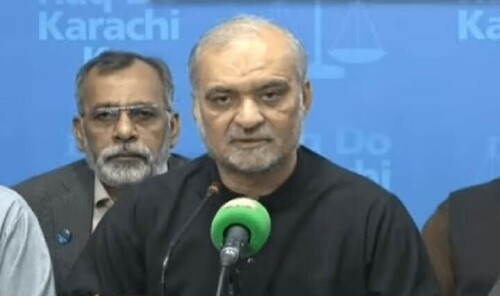KARACHI: The Sindh High Court (SHC) on Friday directed the provincial law officer to file comments in a petition filed by the Jamaat-i-Islami (JI) seeking an end to the “transition period” in the towns and empowerment of the elected representatives of the local government (LG).
Karachi JI chief Hafiz Naeemur Rehman, along with the 10 elected chairmen of union committees (UCs) and town municipal corporations (TMCs) of the party, petitioned the SHC and contended that all the LG elected representatives had taken oath in June, but they were still left practically dysfunctional by way of appointing “transition officers”.
At the outset, the two-judge bench headed by Chief Justice Ahmed Ali M. Shaikh said the petitioners had been elected and also sworn in and inquired from their counsel if they were not allowed to perform their functions.
Representing the petitioners, Usman Farooq advocate contended that since the petitioners did not belong to the ruling party, the respondents were not allowing them to perform their functions in accordance with law.
The counsel asserted that the provincial authorities through a notification had made the elected representatives of the local government dysfunctional.
He also argued that amendments were made in the Sindh Local Government Act in contravention to the constitution to clip the powers of the elected LG representatives.
The bench directed the Sindh advocate general to file comments on behalf of the respondents in four weeks.
Citing Sindh chief secretary, secretary local government department and “transition officers” of the seven defunct district municipal corporations of the city as respondents, the petitioners argued that initially the Sindh government had continuously been trying its best to delay LG elections from 2009 to 2015 and again from 2020 to 2023, and during such period, the government took over all the LG matters and appointed administrators to exercise all administrative and financial powers in violation of the apex court’s judgements.
They also argued that the recent LG elections were held under the Local Government Act, 2013 and at the time of commencement of such law, the transition period of six months was fixed for effective implementation of the provisions of the act.
After completion of the tenure of the last local government in 2020, an amendment was made to the LG act and thereby DMCs working in Karachi were restructured and further divided into 25 TMCs and UCs were also increased to 247, they maintained.
The petitioners further asserted that despite the passage of around one-and-a-half years since the restructuring, the provincial government did not take any initiative for the constitution of town and UC administrations, distribution of assets, opening of bank accounts and inking agreements for the functioning of the towns and UCs.
They argued that even offices/sitting places had not been provided to the chairmen and vice-chairmen of the towns and UCs.
Published in Dawn, August 19th, 2023













































Dear visitor, the comments section is undergoing an overhaul and will return soon.